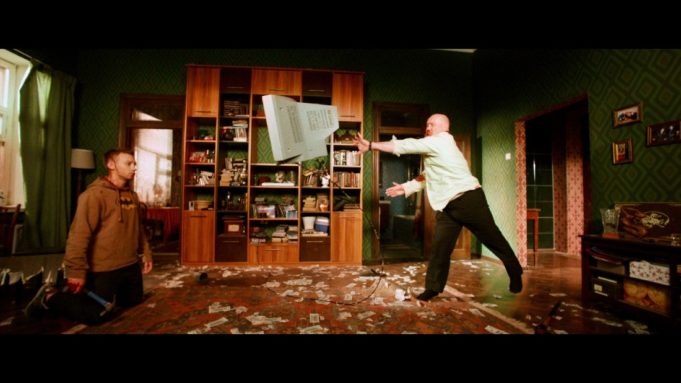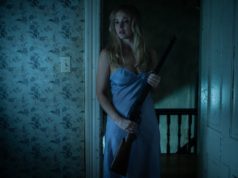Despite the rich history of Russian film, which kept going even under the Soviet regime’s censorship, not many movies from that country reach us now. An assiduous filmgoer might be aware of Andrei Zvyagintsev’s stark contemporary dramas or Alexander Sokurov’s relentlessly experimental films. This week, however, two new films are available to us online to while away our quarantine hours and show us new sides of this multifaceted cinema.
The work of a filmmaker who hasn’t turned 30 yet, Beanpole came away from Cannes with some notable prizes last year. This drama is a remarkable study of a people permanently scarred by war as they dig themselves out from the ruins, and like last week’s Bacurau, it’s among the Grand Berry Theater’s streaming offerings that will benefit the fledgling art-house cinema.
The story is set in the ruins of Leningrad in the fall of 1945, a city that has now gone quiet because, as someone points out, the starving people ate all the stray dogs and cats. “Dylda,” or “Beanpole,” is the nickname of Iya Sergeyeva Tsvylyova (Viktoria Miroshnichenko), a nurse at a hospital for wounded soldiers who towers over her colleagues and people on the street. A former army officer, she was discharged due to repeated concussions that have left her prone to incapacitating seizures. She takes care of a little boy (Timofey Glazkov) belonging to her fellow soldier Masha (Vasilisa Perelygina) while she’s still at the front, until one of Iya’s seizures leads to the boy’s death. When Masha returns home, Iya doesn’t tell her the whole truth about it.
Director/co-writer Kantemir Balagov is 28 years old, hails from the Caucasus region, and adopts a slow-rolling approach that occasionally rolls too slow, with scenes going on after they’ve made their point. These are worth sitting through, though, for the ones in which his pace pays off, as when Iya assists a quadriplegic patient (Konstantin Balakirev) who wants to die. The director’s eye is evidenced in striking compositions and the decor in Iya and Masha’s apartment, where Masha’s new soldier boyfriend (Igor Shirokov) applies entirely too much red and green paint to the walls.
Officially, Iya and Masha are former anti-aircraft gunners, but we’re told early on that this is just code for prostitutes in uniforms for the men to make use of. They’ve come out the other side of the war broken in many ways, and Masha is at times unspeakably cruel to Iya. Nowhere is this clearer than when Masha holds Iya responsible for her son’s death and forces her to have sex with their boss (Andrei Bykov) so she can become pregnant, Masha now being unable to do so. Iya makes Masha lie in the bed while the sex goes on, and the whole thing becomes hideous. At another point, Masha borrows a green dress from a neighbor and becomes overwhelmed with emotion because it’s the first nice thing she’s had to wear in at least four years.
What makes the film bearable, not to mention surprising, is that Iya takes the abuse because she’s in love with Masha. That love stays platonic (even though Iya loses control once and kisses her), which is probably why the Russian government submitted Beanpole for the foreign film category at last year’s Oscars. The two lead actresses are both making their film debuts, and the ghostly Miroshnichenko especially acquits herself well, folding her six-foot height on herself as a character who’s accustomed to being mistreated but still harbors a desire for something better than her wartime existence. The final scene, when Masha finally realizes who has really loved her the whole time, is a deeply moving one that hints that even in the deep freeze of the Soviet Union, beauty and joy might still spring one day.
If you prefer a film with that famously dark Russian sense of humor, check out Why Don’t You Just Die!, a provocative title for our times. The original Russian title translates as “Daddy, Die!”, but the English one is more appropriate, as various characters absorb numerous stab, gunshot, and other wounds before they expire. This filmmaking debut by Kirill Sokolov reminds me of similar debuts in the Coen brothers’ Blood Simple and Danny Boyle’s Shallow Grave, crime films whose physical and moral grubbiness contrasts with the neatness with which the plot elements fall into place.
The story begins with the arresting image of a nervous young man named Matvei (Alexander Kuznetsov) ringing someone’s apartment doorbell with his left hand while clutching a hammer behind his back with his right. He intends to use it on Andrei (Vitaly Khaev), a mean-looking middle-aged man with a shaved head, but farcical stuff keeps preventing Matvei from acting — a neighbor with a vicious dog walks by, Andrei’s wife (Elena Shevchenko) is unexpectedly home, Matvei finds out that his target is a homicide detective. The violence does eventually break into some nice bloody slapstick, with low-quality furniture being destroyed and Matvei’s ass literally being put through a wall. When Andrei throws a 1990s-vintage analog TV at Matvei, the film goes into slow motion as the screen hits his head and shatters, throwing glass shards everywhere.
Soon afterwards, Sokolov uses the same technique to depict someone making tea, which opens him up to the charge of affectation. Even so, it’s hard not to marvel at the way he uses flashbacks to fill in relevant information, such as why Matvei is there to bash the cop’s skull into his brain. One such sequence has an unseen criminal mentor showing Matvei how to pick the lock on a set of handcuffs, and this vastly entertaining scene is probably even more so if you speak enough Russian to decipher the guy’s profanity. Matvei’s attempt to unchain himself with a hairpin results in him having to stick his tongue down a bathtub drain to retrieve it, a disgusting touch that’s reminiscent of the Coens’ “the gods look down and laugh” tone.
The mayhem eventually pulls in Andrei’s cop partner (Michael Gor) and his daughter (Evgenia Kregzhde), who happens to be Matvei’s girlfriend. She may be lying about her father having raped her as a child, but then Andrei may be even worse than a child molester — he applies a power drill to Matvei’s body and then calmly goes into his kitchen and stands at his refrigerator eating a salami while covered in blood. The way greed and mostly petty grudges drive these people to torture and murder feels quite a bit of our rapacious age. Sokolov’s antic sense of humor helps it go down easy.
Beanpole
Starring Viktoria Miroshnichenko and Vasilisa Perelygina. Directed by Kantemir Balagov. Written by Kantemir Balagov and Alexander Terekhov. Not rated.Why Don’t You Just Die!
Starring Alexander Kuznetsov and Vitaly Khaev. Written and directed by Kirill Sokolov. Not rated.












